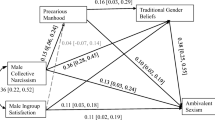Abstract
This research study examined correlates of male identity statuses as postulated in Wade's (1998) theory of male reference group identity dependence. The Reference Group Identity Dependence Scale (RGIDS; Wade & Gelso, 1998) was correlated with measures of identity aspects (personal, social, and collective), belongingness, and a universal-diverse orientation. Based on the responses of 172 predominantly middle-class undergraduate college men (59% White, 15% Asian American or Pacific Islander, 13% African American, 4% Hispanic, and 9% other race/ethnicity, e.g., biracial, Arab American, Egyptian American), as predicted, the No Reference Group status negatively related to collective identity and social connectedness; the Reference Group Dependent status positively related to social identity and social connectedness; and the Reference Group Nondependent status positively related to personal identity, collective identity, social connectedness, and a universal-diverse orientation toward others.
Similar content being viewed by others
REFERENCES
Berzonsky, M. D., Trudeau, J. V., & Brennan, F. X. (1988, March). Social- cognitive correlates of identity status. Paper presented at the second biennial meeting of the Society for Research on Adolescence, Alexandria, Virginia.
Brittan-Powell, C. S. (1999). White adaptation to racial pluralism: The development of a theory and psychometric instrument on the racially pluralistic psychosocial competence of White Americans. Doctoral dissertation, University of Maryland, College Park, Maryland.
Cheek, J. M. (1989). Identity orientations and self-interpretation. In D. M. Buss & N. Cantor (Eds.), Personality psychology: Recent trends in emerging directions (pp. 275–285). New York: Springer-Verlag.
Cheek, J. M., & Briggs, S. R. (1982). Self-consciousness and aspects of identity. Journal of Research in Personality, 16, 401–408.
Cheek, J. M., Tropp, L. R., Chen, L. C., & Underwood, M. K. (1994, August). Identity orientations: Personal, social, and collective aspects of identity. Paper presented at the 104th Annual Convention of the American Psychological Association, Los Angeles, California.
Cheek, J. M., Underwood, M. K., & Cutler, B. L. (1985). The Aspects of Identity Questionnaire (III). Unpublished manuscript, Wellesley College,Wellesley. Massachusetts.
Hengst, H. (1997). Negotiating “us”and “them”: Children's constructions of collective identity. Childhood: A Global Journal of Child Research, 4, 43–62.
Hogan, R., & Cheek, J. M. (1983). Identity, authenticity, and maturity. In T. R. Sarbin & K. E. Scheibe (Eds.), Studies in social identity (pp. 339–357). New York: Praeger.
Kohut, H. (1984). How does analysis cure? New York: International Universities Press.
Kowalski, R. M., & Wolfe, R. (1994). Collective identity orientations, patriotism, and reactions to national outcomes. Personality and Social Psychology Bulletin, 20, 533–540.
Lee, R. M., & Robbins, S. B. (1995). Measuring belongingness: The Social Connectedness and Social Assurance Scales. Journal of Counseling Psychology, 42, 232–241.
Lee, R. M., & Robbins, S. B. (1998). The relationship between social connectedness and anxiety, self-esteem, and social identity. Journal of Counseling Psychology, 45, 338–345.
Marmarosh, C. L., & Corazzini, J. G. (1997). Putting the group in your pocket: Using collective identity to enhance personal and collective self-esteem. Group Dynamics, 1, 65–74.
McCreary, D. R. (1990). Multidimensionality and the measurement of gender role attributes: A comment on Archer. British Journal of Social Psychology, 29, 265–272.
Miville, M. L. (1992). Measuring and defining universal orientation. Masters thesis, University of Maryland, College Park, Maryland.
Miville, M. L., Gelso, C. J., Pannu, R., Liu, W., Touradji, P., Holloway, P., & Fuertes, J. (1999). Appreciating similarities and valuing differences: The Miville- Guzman Universality- Diversity Scale. Journal of Counseling Psychology, 46, 291–307.
Sampson, E. E. (1978). Personality and the location of identity. Journal of Personality, 46, 552–568.
Schlenker, B. R., & Weigold, M. F. (1990). Self-consciousness and self-presentation: Being autonomous versus appearing autonomous. Journal of Personality and Social Psychology, 59, 820–828.
Sherif, M. (1962). The self and reference groups: Meeting ground of individual and group approaches. Annals of the New York Academy of Sciences, 96, 797–813.
Tropp, L. R. (1992). The construct of collective identity and its implications for the Wellesley College context. Bachelor's honors thesis, Wellesley College, Wellesley, Massachusetts.
Wade, J. C. (1998). Male reference group identity dependence: A theory of male identity. Counseling Psychologist, 26, 349–383.
Wade, J. C. (2000, August). Reference group identity and professional men's attitudes toward race and gender equity. Paper presented at the 108th Annual Convention of the American Psychological Association, Washington, D.C.
Wade, J. C., & Brittan-Powell, C. S. (in press). Men's attitudes toward race and gender equity: The importance of masculinity ideology, gender-related traits, and reference group identity dependence. Psychology of Men and Masculinity.
Wade, J. C., & Gelso, C. J. (1998). Reference Group Identity Dependence Scale: A measure of male identity. Counseling Psychologist, 26, 384–412.
Wright, S. S., & Forsyth, D. R. (1997). Group membership and collective identity: Consequences for self-esteem. Journal of Social and Clinical Psychology, 16, 43–56
Author information
Authors and Affiliations
Rights and permissions
About this article
Cite this article
Wade, J.C., Brittan-Powell, C. Male Reference Group Identity Dependence: Support for Construct Validity. Sex Roles 43, 323–340 (2000). https://doi.org/10.1023/A:1026695209399
Issue Date:
DOI: https://doi.org/10.1023/A:1026695209399




